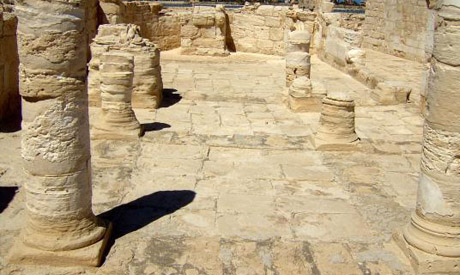 Al-Hamam Antiquities Inspectorate has succeeded to remove encroachment on Al-Bordan archaeological site, located on Alexandria-Marsa Matrouh highway, in collaboration with Egypt’s tourism and antiquities police.
Al-Hamam Antiquities Inspectorate has succeeded to remove encroachment on Al-Bordan archaeological site, located on Alexandria-Marsa Matrouh highway, in collaboration with Egypt’s tourism and antiquities police.
The site includes remains of Graeco-Roman fortresses, roads, temples and cemeteries.
The encroachment on the Al-Bordan archaeological site, located on kilometre 67 on Alexandria-Marsa Matrouh highway, started Friday when a large truck invaded the site with a construction bulldozer, which on its turn damaged a cluster of authentic structures that date back to the Graeco-Roman era, according to director of Marina Al-Alamein Antiquities Khaled Abul-Magd.
Abul-Magd accused Yasser Khalil, owner of a contractor company, and truck driver Mohamed Abdel Sattar of violating and damaging the archaeological site. The tourism and antiquities police arrested both accused, but they denied all charges. Both are in custody until the completion of investigations.
On Saturday, all encroachment has been removed, but the site is almost completely damaged.
Egypt has reportedly suffered from illegal urban and agricultural encroachment on archaeological sites.
Earlier in March, residents of neighbouring Al-Hagg Qandil village began cultivating the area around a collection of 18th-dynasty noblemen’s tombs at the ancient site of Tel Al-Amarna in the Upper Egyptian city of Minya, which was Egypt's capital during the reign of monotheistic pharaoh Akhenaton.
Minya’s archaeological inspectorate sent a report to both local police and the antiquities ministry.
The ministry ordered a halt to the encroachment and stepped up security in the area, while tourism and antiquities police were deployed nearby.
Dahshur, 30 km north of Giza plateau, was subjected to violation in January 2013. Residents of the neighbouring Dahshur village proceeded to construct a collection of modern cemeteries before the Black Pyramid of King Amenhotep II.
However, Dahshur residents halted construction of the structures after the antiquities ministry offered to provide them with land far from the archaeological site on which to build a cemetery.



